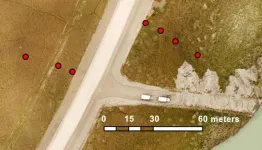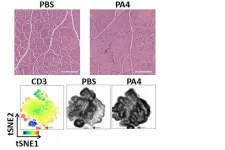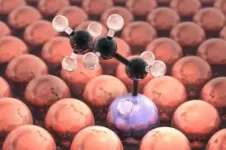(Press-News.org) Roads, bridges, pipelines and other types of infrastructure in Alaska and elsewhere in the Arctic will deteriorate faster than expected due to a failure by planners to account for the structures' impact on adjacent permafrost, according to research by a University of Alaska Fairbanks Geophysical Institute permafrost expert and others.
The researchers say planners must account for the sideward repercussions of their projects in addition to the usual projection of the direct top-down effects.
The finding was presented in a May 31 paper in The Cryosphere, a publication of the European Geosciences Union.
UAF Geophysical Institute geophysics professor Vladimir Romanovsky is among the 13 authors of the paper. Principal researcher for the project is Thomas Schneider von Deimling of the Alfred Wegener Institute Helmholtz Centre for Polar and Marine Research in Potsdam, Germany.
The research focused on a portion of the Dalton Highway on Alaska's North Slope about 10 miles south of the Prudhoe Bay oil fields. Sensors monitored the temperature at seven locations, three to the west of the highway and four on the east.
The researchers found that top-down thawing isn't confined to the area beneath the road surface. They found instead that thawing spreads outward, leading to destabilization of the embankment and subgrade and that it is caused by the formation of taliks -- areas of ground that have thawed and remains unfrozen year-round -- under a roadway's toe, the prepared zone at the base of the embankment and abutting the natural terrain.
The result, the authors write, is an accelerating thaw rate and earlier than anticipated road failure -- and a warning that other types of Arctic infrastructure such as pipelines, fuel storage tanks and airports will fail sooner than projected.
The fieldwork and subsequent computer modeling of a gravel road built on continuous permafrost found that a slow and gradual thaw will lead to an accelerated "and likely irreversible permafrost degradation" and that "road failure is inevitable once a critical level of ground warming has been reached" absent extensive ground-cooling measures, the authors write.
The authors write that their findings show a shortcoming in other infrastructure risk assessment methods, which fail to adequately capture changes in permafrost and don't analyze the interaction between the infrastructure and the adjacent ground.
Those shortcomings make current estimates of infrastructure failure dates inaccurate.
"You cannot make blank decisions when you're dealing with permafrost," said Romanovsky, a longtime permafrost researcher. "You always have to be more specific about the region, about the amount of ice in permafrost and about the infrastructure itself. And when you take all of this into consideration -- and climate change -- you can make a much more educated decision."
The research will prove more beneficial in the planning of new roads than in the maintenance of existing roads, for which little can be done to change their initial construction. The research will, however, give transportation managers a better idea of when existing roads are likely to fail, Romanovsky said.
"The Department of Transportation can, using these results, understand how much they have to plan to spend to keep roads in good condition," he said. "They have a good idea in the near term, but they don't know what to expect, say, 10 years from now when the permafrost will be even more vulnerable than it is right now and how this thawing process will continue."
The authors conclude by saying it is "crucial to consider climate change effects when planning and constructing infrastructure on permafrost as a transition from a stable to a highly unstable state can well occur within the infrastructure's service lifetime (about 30 years)."
They add that their focus on the Dalton Highway illustrates that "such a transition can even occur in the coming decade for infrastructure built on continuous permafrost that displays cold and relatively stable conditions today."
INFORMATION:
ADDITIONAL CONTACT: Vladimir Romanovsky, University of Alaska Geophysical Institute, veromanovsky@alaska.edu.
NOTE TO EDITORS: Images from the research paper are available with this press release online at http://www.gi.alaska.edu. The research paper is available at https://tc.copernicus.org/articles/15/2451/2021/#abstract
For the past several years, chemical engineer Michelle O'Malley has focused her research on the anaerobic fungi found in the guts of herbivores, which make it possible for those animals to fuel themselves with sugars and starches extracted from fibrous plants. O'Malley's work, reflected in multiple research awards and journal articles, has centered on how these powerful fungi might be used to extract value-added products from the nonedible parts of plants -- roots, stems and leaves -- that are generally considered waste products.
Now, her lab has discovered that those same fungi likely produce novel "natural products," which could function as antibiotics or other compounds of use for biotechnology. The research is described in a paper titled "Anaerobic gut ...
The body's immune cells naturally fight off viral and bacterial microbes and other invaders, but they can also be reprogrammed or "trained" to respond even more aggressively and potently to such threats, report UCLA scientists who have discovered the fundamental rule underlying this process in a particular class of cells.
In END ...
CHAMPAIGN, Ill. -- Researchers report that small quantities of useful molecules such as hydrocarbons are produced when carbon dioxide and water react in the presence of light and a silver nanoparticle catalyst. Their validation study - made possible through the use of a high-resolution analytical technique - could pave the way for CO2-reduction technologies that allow industrial-scale production of renewable carbon-based fuels.
The study, led by University of Illinois Urbana-Champaign chemistry professor Prashant Jain, probes chemical activity at the surface of silver nanoparticle catalysts under visible light and uses carbon isotopes to track the origin and production of these previously undetected chemical reactions. The findings are published in the journal Nature Communications.
Sunlight-driven ...
By Benjamin Boettner
(Boston) - Muscular dystrophies are a group of genetic diseases that lead to the progressive loss of muscle mass and function in patients, with the incurable Duchenne Muscular Dystrophy (DMD), which affects all the body's muscles primarily in boys, being particularly severe. DMD can be caused by more than 7,000 unique mutations in the largest gene of the human genome, which encodes a central protein in muscle fibers. While this astounding number of mutations all variably block muscle function, the affected muscles share another common feature - chronic inflammation.
As chronic inflammation ...
Scientists need to focus on tangible efforts to boost equity, diversity and inclusion in citizen science, researchers from North Carolina State University argued in a new perspective.
Published in the journal Science, the perspective is a response to a debate about rebranding "citizen science," the movement to use crowdsourced data collection, analysis or design in research. Researchers said that while the motivation for rebranding is in response to a real concern, there will be a cost to it, and efforts to make projects more inclusive should go deeper than that. Their recommendations speak to a broader discussion about how to ensure science is responsive to the needs of a diverse audience.
"At its heart, citizen science is a system of knowledge production ...
Parents of children with the most complex medical conditions are more likely to report poor or fair mental health and struggle to find community help, according to a study completed by researchers at University of Rochester Medical Center (URMC) and Golisano Children's Hospital. The study was published in Pediatrics, the journal of the American Academy of Pediatrics (AAP).
The study, "A National Mental Health Profile of Parents of Children with Medical Complexity," examined parent-reported data from the National Survey of Children's Health, and compared three groups: households of children with medical complexity (CMC), households of noncomplex children with special health care needs, and households of children ...
Not all stresses are created equal, according to a pair of new studies, which shows that distinct ubiquitination patterns underlie cell recovery following different environmental stressors. Eukaryotic cells respond to environmental stressors - such as temperature extremes, exposure to toxins or damage, for example - through adaptive programs that help to ensure their survival, including the shutdown of key cellular processes. These responses are often associated with the formation of stress granules (SGs) - dense cytoplasmic aggregations of proteins and RNA - as well as with ...
Although the Antibody Mediated Prevention (AMP) study that launched in 2016 failed to show significant efficacy in a pair of clinical trials, Denis Burton argues in a Perspective that the AMP study's results represent a landmark in AIDS research; they show - for the first time - that a broadly neutralizing antibody (bnAb) can protect humans against exposure to some strains of HIV. According to Burton, the AMP study's data - despite not showing a significant difference between the numbers of infected individuals in the treated groups versus those in the placebo groups - still have tremendous implications for future HIV vaccine design and passive bnAb use strategies. The AMP study evaluated the immunotherapeutic ...
BINGHAMTON, N.Y. -- Analysis of recently discovered fossils found in Israel suggest that interactions between different human species were more complex than previously believed, according to a team of researchers including Binghamton University anthropology professor Rolf Quam.
The research team, led by Israel Hershkovitz from Tel Aviv University, published their findings in Science, describing recently discovered fossils from the site of Nesher Ramla in Israel. The Nesher Ramla site dates to about 120,000-140,000 years ago, towards the very end of the Middle Pleistocene time period.
The human fossils were found by Dr. Zaidner of ...
Researchers at Tufts University, University College London (UCL), Cambridge University and University of California at Santa Barbara have demonstrated that a catalyst can indeed be an agent of change. In a study published today in Science, they used quantum chemical simulations run on supercomputers to predict a new catalyst architecture as well as its interactions with certain chemicals, and demonstrated in practice its ability to produce propylene - currently in short supply - which is critically needed in the manufacture of plastics, fabrics and other chemicals. The improvements have potential for highly efficient, "greener" chemistry with a lower carbon footprint.
The demand for propylene is ...




